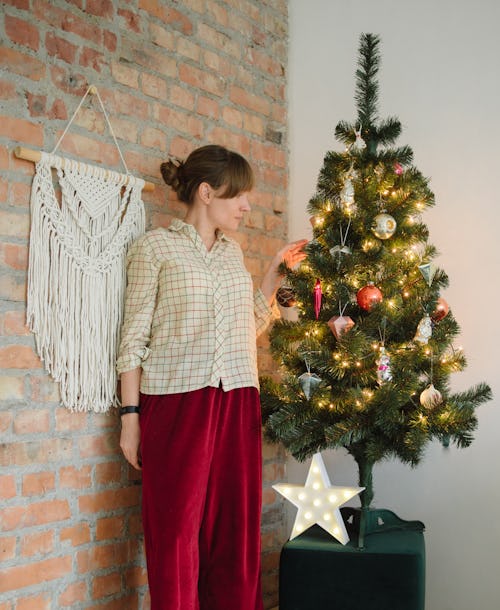Self
Experts’ Best Tips For Dealing With Sadness Around The Holidays
Consider it a holiday gift from you to you.

The holidays can bring a host of feelings to the surface: nostalgia for your mom's vaguely terrible turkey recipe, joy at seeing your fam's smiling faces (even over Zoom), bittersweet thoughts of New Years past, loneliness, or even grief. If you feel sad during the holidays, you're not alone. But there are simple things you can do to cope that might make the twinkling lights easier to deal with.
"Holidays may serve as a strong reminder that things in our life are not quite where we want or expect them to be," Dr. Victoria Chialy Smith, a licensed clinical psychologist, tells Bustle. "We may feel a wide variety of emotions including longing, regret, anger, sadness, and depression."
Give Yourself Permission To Feel
Smith says the unresolved feelings the holidays can evoke are understandable. Perhaps you've experienced loss that feels particularly hard this time of year, or the financial expectations of the season leave you feeling you stressed or self-critical. In 2020, you may not be able to see the ones you love in person. Smith says it's important, first and foremost, to give yourself permission to feel the sadness and heavy feelings. There is no need to get on your own case about not being full of cheer when the rest of the neighborhood is belting out carols.
"Meet all of these difficult emotions with compassion," Smith says. She advises staying grounded in the present when you start getting a wave of old memories, regrets, longings, or difficult emotions. "Try to stay connected to the peace of the present moment by tuning into your breath or what is immediately going on around you," she says.
Dr. Jo Eckler, a chronic illness coach, clinical psychologist, and author of I Can't Fix You Because You're Not Broken: The Eight Keys to Freeing Yourself from Painful Thoughts and Feelings, tells Bustle that you don't have to squash down the feelings you're having. She notes that it can be hard to pretend that you're simply having a wonderful Christmastime (cue music) when you're actually feeling bummed.
But Be Mindful Of Comparisons You Make
Eckler also points out that this time of year is "a ripe time for the comparison trap." She recommends disengaging from compare and despair behaviors. "We see images of families laughing together in handmade matching PJ's and frolicking, or super lovey-dovey couples," Eckler says. "And even though we might have good families or partners ourselves, it's hard to live up to a posed picture." Try to notice your own feelings of comparative despair, whether it's on social media, in conversation, or just in your own head as you walk past the gift displays at the store.
Self-Care Is Key
As for the expectation to get on board the holiday activity train? Well, there is certainly no need for you to be the belle of each holiday ball. But that said, Dr. Rebecca Cowan, of Anchor Counseling & Wellness, LLC, tells Bustle that isolation is something you want to avoid when you're dealing with sadness or symptoms of depression. "When people become sad and depressed, they tend to want to isolate, and this only worsens these symptoms," Cowan says. "Balance is key, and so is implementing a self-care plan."
That means things like sleeping, eating enough, sharing with friends, doing things that make you feel relaxed and happy, and, Cowan says, getting at least 30 minutes a day of sunlight.
Try Something New
Counselor Jessica Eiseman tells Bustle that it can also be helpful to begin to create your own traditions, to make the holidays something you can enjoy. She brings up the term "un-holidays."
"Maybe you don't fit into traditional standards or expectations for the season," Eiseman says. "Maybe you don't celebrate at all or you take a trip by yourself. The most important piece being that you create some meaning based on what you enjoy and brings a little peace, if not happiness." In 2020, that trip by yourself might just be to the other side of your neighborhood, but it can still help.
Eiseman also says that if you don't already have a therapist, connecting with one can be really helpful. If your feelings seem to be worsening, or they are affecting things like your appetite and ability to sleep, try to reach out for professional help when you can.
While the holiday period can bring up all sorts of negative emotions, experts say it's a good idea to prioritize taking caring of yourself. Consider it a holiday gift from you to you.
If you or someone you know is seeking help for mental health concerns, visit the National Alliance on Mental Illness (NAMI) website, or call 1-800-950-NAMI(6264). For confidential treatment referrals, visit the Substance Abuse and Mental Health Services Administration (SAMHSA) website, or call the National Helpline at 1-800-662-HELP(4357). In an emergency, contact the National Suicide Prevention Lifeline at 1-800-273-TALK(8255) or call 911.
Experts
Dr. Victoria Chialy Smith, licensed clinical psychologist
Dr. Jo Eckler, chronic illness coach, clinical psychologist, and author
Dr. Rebecca Cowan, of Anchor Counseling & Wellness, LLC
This article was originally published on